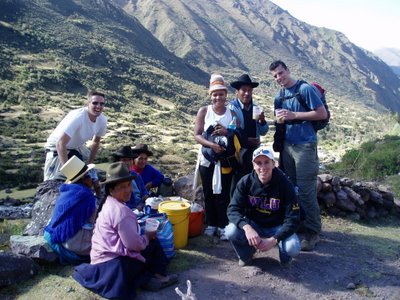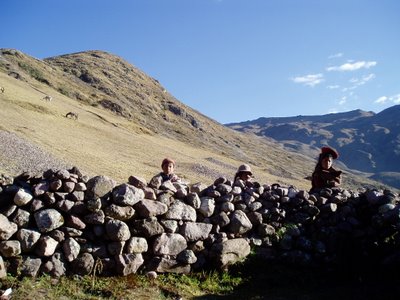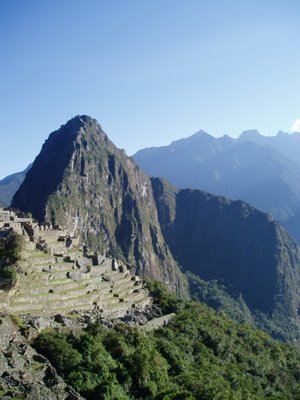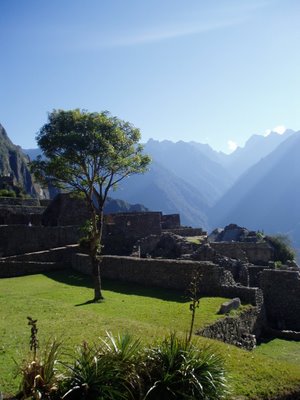Peru
I'm back on my own travelling again, as Pat and Andy have sensibly chosen to return to their jobs, girlfriends, and whatever other commitments they have that got left in Toronto like gunsmoke. I think that if they had stayed much longer than their allotted three weeks, then they too would have divested themselves of those commitments, as I have, or perhaps as they have of me. Another week or so in Rio and we may have forgotten our own names; another trek into the Sacred Valley and our Social Security Numbers would have had no more meaning than a disconnected telephone number; another stamp and 90-day visa and our passports may have ceased to read "Canada". No one, of course, is able to take the experience of travelling so far, but we at least had a taste of it, and I'll follow them shortly in the act of suiting back up in the lives we left.
BsAs to Lima first thing in the morning - a Sunday morning, might I add; as in the kind that follows a Saturday night - and taking the advice of virtually every traveller that I've met, right off to Cusco without even a glimpse at Lima beyond that from our departure terminal. We're not long off the tarmac in Cusco before the (possibly psychosomatic) impact of the much touted altitude crawls into us: do we feel dizzy? Faint of our usual brio and verve? How much are the altitude sickness pills we took really helping us? Was that all-nighter at the pub last night such a good idea? Other than finding ourselves more than usually winded when climbing stairs - or Cusco sidewalks, as one might as well call them - we were largely unaffected by the altitude bugbear in which lurked, supposedly, the potential to ruin our trip. We watched Zidane administer the head-butt heard round the world, followed presumably by some team winning the World Cup. We called it a night quite early on, and prepared for the next four days that would be the culmination of our trip: a trek from Lares to Ollantaytambo, finishing in a visit to Machu Picchu.
Peru, as I had hoped, was not at all like Argentina; whereas the latter is likened often by its residents as a chunk of Europe that had, by some clerical error, been grafted onto South America, Peru's indigenous heritage thrives in its spiritual centres like Cusco and the Sacred Valley, albeit somwhat uneasily with the hordes of visitors - be they Pizzaros or Peers - that overrun these sacred places every day. Our guide Carla, a descendent of Inca royalty, escorted us around the ruins of palaces that would have been her home if not for her birth on this side of the last 500 years. When two young visitors to Machu Picchu were asked to remove themselves from the grass terrace on which they had chosen to rest, the official behind the order was quite vocally criticized by a gentleman who reminded her that these visitors have rights, for after all, "they are Peruvians." Carla confirmed that a particularly reactionary group of indigenous people sought the return of Machu Picchu to its original purpose as a functioning town and sanctuary, not a tourist destination, though the initiative is politically and economically impossible.
All this is not to suggest, however, that the locals we met along the way were somehow hostile. Quite the opposite. Given that they see gringos with backpacks nearly every day, the residents of the small Andean towns that we passed were surprisingly curious and playful. Surprising too given that many of these people have part-time jobs lugging whatever we don't want to carry up and down the Inca Trail. One group was happy to have us by for a chat and glass of chicha (a white corn-based alcoholic beverage), and the kids enjoyed being in pictures and only rarely were so jaded as to jump straight into a request for candy. We played a hotly contested game of football at 3600m, which I'll have to concede to our hosts (and Andy), they being the only ones able to run for more than 15 seconds at that altitude.
I've always thought of myself as being fairly hearty in dealing with the cold, but I've realized that in Canada we work hard to control our doses of it, simply by heating our buildings. While an Andean woman will never step out of her hut in the morning to fetch her llama and have difficulty breathing the -30C air, or have to curse as she scrapes the frost off of the same llama, temperatures got near freezing each night that we camped, as they do virtually every night in the dry season. These people just bundle up and deal with the cold every morning and every night, and if it's not cold, it's raining. Do I really like the cold that much, or is it coming in from the cold that I enjoy so much? Sleeping in all my clothes and my alpaca hat with my sleeping bag pulled up over my head I could only endure for a couple of nights. That's half the year for these people.
Describing Machu Picchu is virtually impossible, so I'll just share a few interesting facts that I learned that day. The word Machu Picchu is Quechua, and means "old mountain". Take the second "c" out of the word "Picchu", and you have an old something that is considerably more vulgar. So one must be certain to pronounce the name correctly. Machu Picchu was "discovered" by Hiram Bingham, a Yale archeologist, who was surprised to find two families living in the ruins when he showed up in 1911. One of the kids was happy to show him around. Pablo Neruda has written that "Machu Picchu is a trip to the serenity of the soul, to eternal fusion with the cosmos, there we feel our own fragility. It is one of the greatest marvels of South America. A resting place of butterflies at the epicentre of the great circle of life. Another miracle." To be sure, it made for a pleasant day trip.
Cusco, former capital of the Inca Empire, is where I spent the rest of our time in Peru. An unabashed tourist town, at least in its centre, it is difficult to walk down the street without someone attempting to entice you into their travel agency, souvenir shop, or restaurant. The tactics used in pursuit of this goal fall just short of a lasso, and walking up Procuradores to my hostel, especially at dinner time, was a task better suited to a tight end than a tourist. Fortunately, I found the town beautiful and interesting enough to reward a few days stay, despite these petty annoyances, and booked my bus out for Sunday, a few days after Pat and Andy flew home. The next stop was Copacabana: not the hottest spot north of Havana of Barry Manilow fame, nor the beach where we played football in Rio, but rather the less notorious town in Bolivia on the shore of Lake Titicaca. From there to La Paz and the rest of Bolivia, and finally - I hoped - a glimpse of South America.





0 Comments:
Post a Comment
<< Home